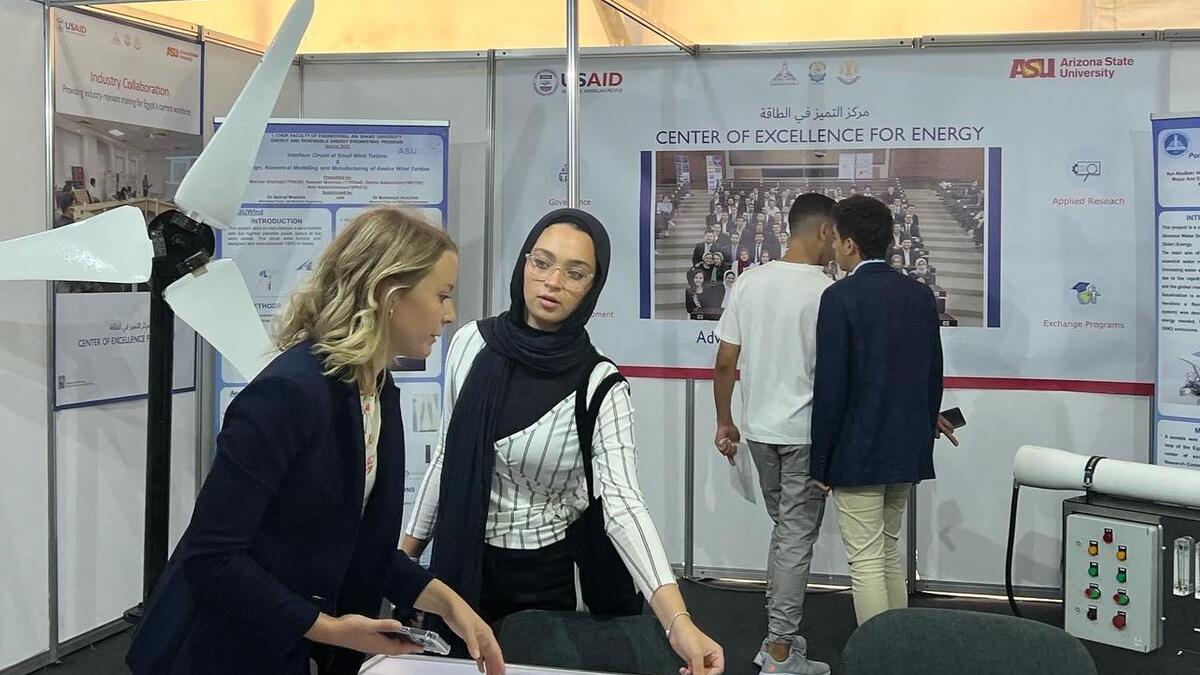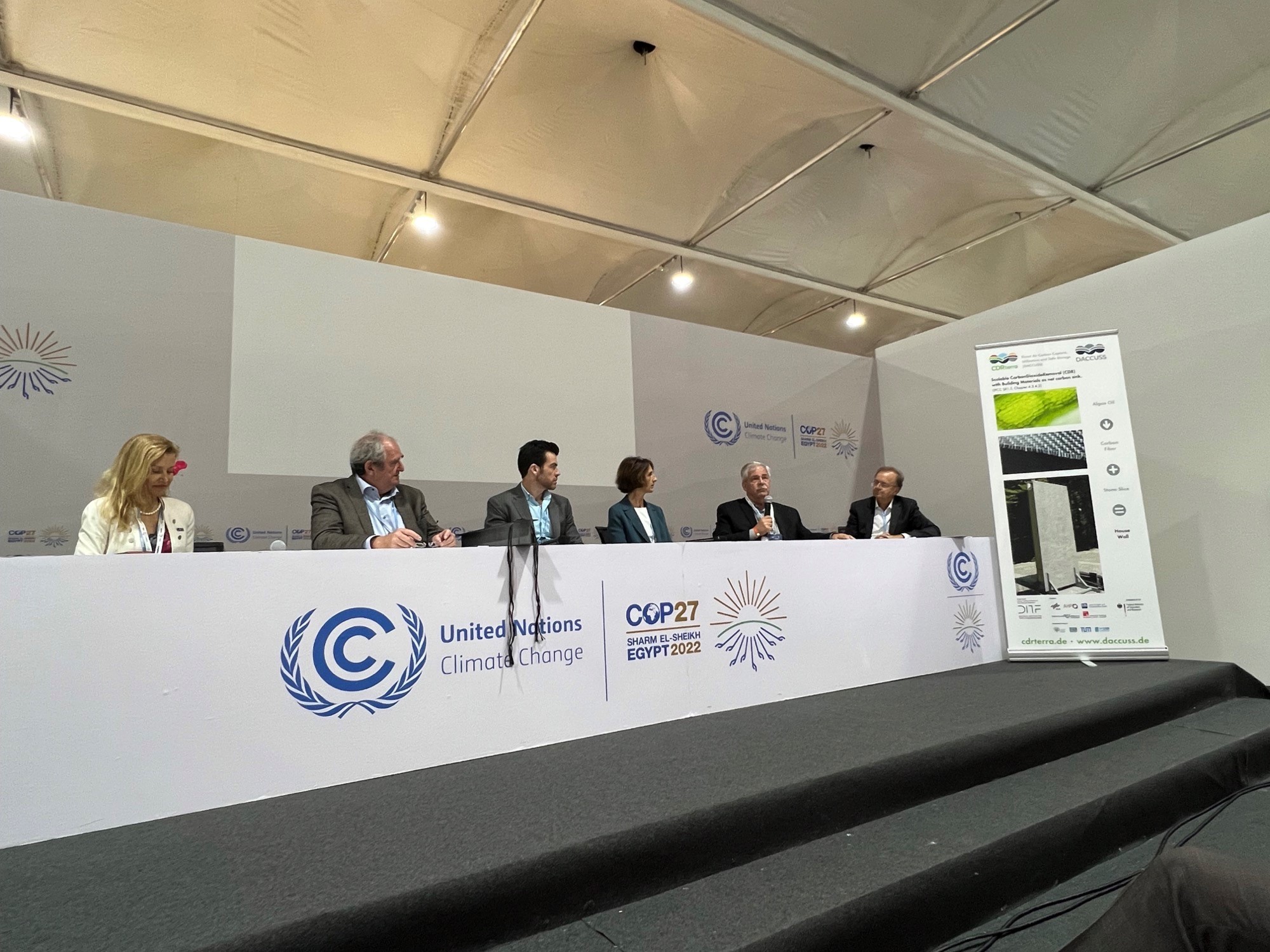ASU brings energy, carbon capture solutions expertise to COP27 global climate conference

ASU hosted more than 15 events, including panels and presentations, at COP27. Photo courtesy Sayfe Kiaei
At COP27, the United Nations' annual climate summit, members of Arizona State University joined leaders and policymakers from across the globe on the front lines of climate negotiations and solutions.
COP27 takes place from Nov. 6 to 18 in Sharm el-Sheikh, Egypt, where the world convenes to ensure the planet does not exceed the parameters of the 2015 Paris Agreement. ASU’s presence this year demonstrates the university’s commitment and contributions to the global climate crisis.
Peter Schlosser, vice president and vice provost of the Julie Ann Wrigley Global Futures Laboratory at ASU, said the university's participation at COP27 is paramount in bringing ASU’s expertise to a global scale. He emphasized that the only way to tackle global issues is to take part in global discussions that build understanding and develop relationships that lead to options and the implementation of solutions.
“COP is one of the most important venues or means to discuss and negotiate climate change solutions,” said Schlosser, who is among a group of ASU faculty and leadership at the conference. “We want to have a broader presence at COP in two ways,” Schlosser said. “We want to bring our knowledge into the discussion, and we want to be informed by the discussions on what is the most important knowledge to be gathered.”
ASU is participating in COP27 in a variety of ways, including the launch of the 10 Must Haves initiative, a report of the outcomes from the inaugural Global Futures Conference on Nov. 12. The university’s presence at COP27 can be primarily felt in the “Blue Zone” of the event, which houses negotiation rooms, pavilions, office space and side event space.
ASU’s participation comprises more than 15 ASU community members, including students, alumni and special guests from partner organizations, as well as faculty and staff from the Global Futures Laboratory, Thunderbird School of Global Management and the Ira A. Fulton Schools of Engineering.
Presenting important 'must haves' and new insights for the future
On Nov. 12, the Julie Ann Wrigley Global Futures Laboratory focused on the release of two key reports. The first was the “10 New Insights in Climate Science” (10NICS), authored by The Earth League, of which Schlosser is the co-chair, Future Earth and the World Climate Research Programme. The 10NICS report looks at trends and discoveries in climate science and solutions, and formulates recommendations for action by the COP negotiators and other interested parties.
Immediately following that presentation, Schlosser and Johan Rockström, director of the Potsdam Institute for Climate Impact Research, presented the 10 Must Haves initiative. The initiative was created at the Global Futures Conference in September, hosted jointly by ASU’s Global Futures Laboratory and the Earth League, to provide actionable “must have” and “must do” guidelines to ensure a sustainable future for life on Earth. The presentations were part of the Pathways to 1.5 Pavilion, where ASU is a co-host.
“We are quite proud of our work on the 10 Must Haves and 10NICS, as they were derived through a rigorous co-production process, and the outcomes are accessible and strive to be implementable to those tackling some of the world’s most pressing challenges,” said Clea Edwards, a research scientist for the Earth League and Global Futures Laboratory who was a key coordinator on the 10 Must Haves and attended COP27. “We’re all on the ground, making those connections and positioning the work we do at ASU to be put to practical, impactful use.”

Amanda Ellis (far left) and Peter Schlosser (far right) of the Julie Ann Wrigley Global Futures Laboratory participated in panel discussions and other side events throughout COP27. Photo courtesy Julie Ann Wrigley Global Futures Laboratory
Overcoming barriers to ensure our future
“Our presence at COP will contribute our knowledge and expertise in terms of education, research, networks and partnerships in support of the world’s efforts to mitigate climate change,” said Amanda Ellis, senior director of global partnerships and networks for ASU’s Global Futures Laboratory. “This is an opportunity for our faculty and staff, our experts, to speak on the advancements they’ve been involved in.”
Ellis, former ambassador for New Zealand to the United Nations, is both moderating and speaking at multiple events throughout COP27. She said the conference is a platform to enact change, but it is not without challenges.
“The fact that 195 parties finally agreed on a global approach to climate change in 2015, after so many years of negotiations, is very positive,” Ellis said. “But the fact that there is no global enforcement mechanism for nationally determined contributions means that this is a less-than-perfect process. You’re looking at those who are doing the most damage getting away with a lot and those who are doing the least damage being most impacted.”
Schlosser said that like any complex system, COP may not be perfect. However, he is optimistic about the conversations that can come from COP27.
“Any kind of political process is multifaceted,” Schlosser said. “In spite of its flaws, you have to look at COP as a platform of exchange with good intentions.”
Ellis said she hopes to see those good intentions come to life at COP27, where work from experts within the Global Futures Laboratory and other ASU affiliations will be on display to contribute to actionable global solutions.
“The idea of just and regenerative global futures that (are) simultaneously grounded in Indigenous knowledge and draw on emerging tech is, for me, very hopeful,” Ellis said. “I see our group from ASU as mobilizers and multipliers for solutions.”
Location and impact
Sayfe Kiaei, director of the USAID-funded Center of Excellence for Energy in Egypt, is attending COP27 with a non-ASU delegation. Kiaei is a professor at ASU's School of Electrical, Computer and Energy Engineering and served as director of the Connection One Center at the Ira A. Fulton Schools of Engineering.
His work in energy has taken him to Egypt on multiple occasions aside from COP, and he said the conference’s location allows for institutions such as ASU to provide more support to institutions within Egypt and beyond.
“Egypt plays a big role in energy and is one of the leading nations in its region,” Kiaei said. “When you’re here, you see significant pollution and other issues in the larger cities. Coming to a place that needs more support has an impact, and making a change here would make an impact both nationally and internationally.”
He said contributions from ASU’s faculty and staff on issues such as climate, carbon capture, energy and beyond are crucial — and necessary — in allowing the university to play such a part at COP27.
“The outcomes of COP are a critical thing. It’s worth being here and making a contribution. Not being here is not something we can afford.”
More Science and technology

Cracking the code of online computer science clubs
Experts believe that involvement in college clubs and organizations increases student retention and helps learners build valuable…
Consortium for Science, Policy & Outcomes celebrates 25 years
For Arizona State University's Consortium for Science, Policy & Outcomes (CSPO), recognizing the past is just as important as…

Hacking satellites to fix our oceans and shoot for the stars
By Preesha KumarFrom memory foam mattresses to the camera and GPS navigation on our phones, technology that was developed for…